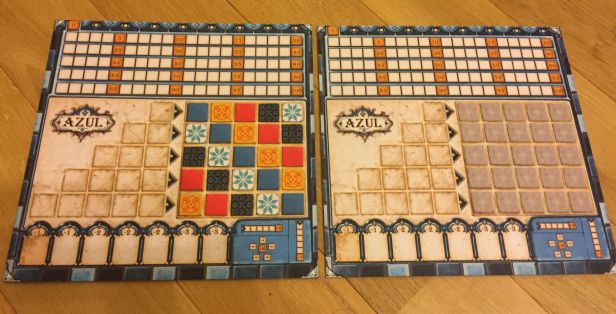| About game: |
Azulejos – initially white and blue tin-glazed ceramic tileworks – were introduced by Moors and only taken over by Portuguese when their king, Manuel I, was fascinated by them during his trip to Alhambra place in the southern Spain. The king immediately ordered his own royal palace to be refurbished using similar ceramic – and you, my Dear Player, as one of the artists hired by king, have a goal to make the Evora Royal Palace magnificent. In Azul we alternate with other players the placement of tiles symbolizing azulejos which we get from ceramic factories. At the end of the turn players check if they managed to place the tile and – based how they did it – score points. As usually, player with the highest amount of points wins the game. |
| Number of players: | 2-4 (for me the best is 4) |
| Playing time: | Initially 30 minutes, later – easily in 20. |
| Complication: | Low-medium complexity game which will give you fun for many sessions. |
| What I like: |
|
| What I do not like: |
|
| For whom? |
This is game both for the beginners as well as experienced players – can be used as warm-up, interlude between longer games or a way to introduce new players. What is important, younger players can be also engaged – those youngest ones to do the drawing / clean-up, those slightly older should quickly catch-up with game mechanics and be able to play. |
| More about the game: |
Now couple of pictures from the game.
Game versions:

Beautiful azulejos:

VERDICT:

See you in another game review!
PS. If you would like to read other session reports from my blog in English, just click on Category: In English


Ja zagrałem do tej pory dwa razy i gra szczerze mówiąc średnio mi się podoba. Ale ja generalnie nie za bardzo lubię i gry logiczne i gry krótkie.
Z drugiej jednak strony, gra wzbudziła moją ciekawość i kilka partii, przed wyrobieniem sobie ostatecznej opinii, chętnie bym jeszcze zagrał.
W grę na pewno warto zagrać, żeby jej spróbować. Obiektywnie nie jest to zła pozycja.
LikeLike
Dokładne takie samo mam zdanie – warto zagrać, fajny przerywnik lub wprowadzenie nowych graczy, ale na pewno nie główna pozycja wieczoru.
LikeLike